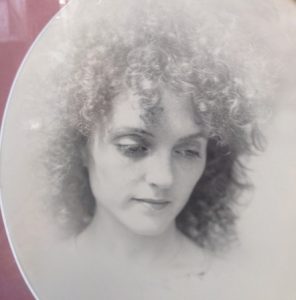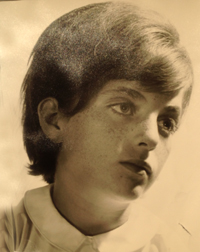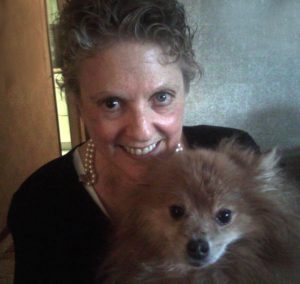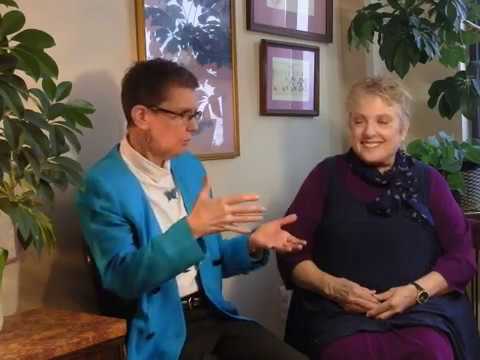(Note: Bipolar disorder causes extreme mood swings of emotional highs (mania) and lows (depression). EMDR is a therapeutic technique that reduces painful emotions and neutralizes bad memories using “bi-lateral stimulation”, usually eye movements.)
The following is from 2 interviews I have had with Laura:
Suzanne: Laura can you paint a picture of how things were before you were diagnosed with bipolar disorder in your late teens?
Laura: I did not know how to function so I took pills. Medication that I got from my father who was a physician. I took speed during the day and Seconal at night to sleep and Darvon to get high. So I would carry them in my pocket and eat them without water just to sustain myself.
Suzanne: To help you with the moods you were having?
Laura: The moods. I was so miserable. Pills helped me function. When I had to go to work I would take Speed.

Suzanne: Then you started to receive treatment for your bipolar disorder. Mental health treatment has changed a lot over the years. What was treatment like in the 1970’s?
Laura: Treatment then was in the dark ages. They put me on Haldol and Thorizine. I had long stays in the hospital that were very frightening and horrible. I was sluggish, disoriented and shuffled down the hall. I felt so sick on that heavy duty medication.
Suzanne: But then you had a period of normalcy for 3 or 4 years?
Laura: Yes, I had 6 hospitalizations then I went back to school and I did well in school studying education. But then the symptoms did come back. I had the same symptoms and messages I had earlier in my life. I was just as scared, was unable to function, and had to drop out of school 4 or 5 times. I had more hospitalizations. I was miserable.
Suzanne: Could you tell us what some of your symptoms of bipolar disorder were?
Laura: At the beginning I was scared of everything. I was scared of people. I was scared of places. I also had paranoia. I felt people were looking at me all the time. My symptoms were so paralyzing. I could not talk to people. And if I did have an interaction with a person I regretted what I said so painfully.
Suzanne: Were you ever so depressed that you could not get out of bed?
Laura: Yes, there were many days I could not get out of bed.
Suzanne: Did you have times where you went several days without sleeping?
Laura: I was mostly depressed but I did have two instances of mania. During one of them I believed I was awake 14 days and nights in a row but I know that is not possible. I felt up. I felt powerful. I ended up in the hospital where they gave me Halcion to get me to sleep.
Suzanne: It took a lot to bring you back down from your mania.
Laura: My depression was so severe I attempted suicide over and over and over again. I would be successful in school or theater and then I would crash. Over and over. I had a total of 21 hospitalizations. I was hospitalized 15 times in 2003. I spent 4 months in one hospital. I spent two years in a group home.
Suzanne: Did you ever have suicide thoughts?
Laura: Suicide was a constant enemy. The thoughts came and went. I tried to kill myself 5 or 6 times. You want to get out. You are in such agony. It hurt so much. I just wanted to get out. I thought “It will be over. It will be over.”
Suzanne: I know that medications have changed a lot over the years. Do you feel the newer medications have helped you?
Laura: Absolutely.
Suzanne: Can you tell us about your involvement with theatre?
Laura: I had done theatre all my life because my parents introduced me to it. But I found a theatre in my late 30’s that I loved. I became a member there. I had a family there. After a show that I directed and performed in, I crashed and would go into the hospital. It was like a roller coaster, Suzanne.
I also had ten ETC treatments. I wanted to die. I thought “I want to die anyway, do what you want with me. I don’t care”.
Suzanne: Did the ETC treatments help you?
Laura: Yes, they helped. After the ETC treatments I did not want to kill myself anymore.
Suzanne: Can you briefly describe the different kinds of psychotherapy you had before you discovered a therapist who did EMDR in 2005?
Laura: I had all different kinds of therapy. I went to many different therapists. When the therapy would not help, I would go to another therapist. I had psychoanalysis for 12 years where I started out having 3 therapy sessions a week. I am sure I communicated but it was fruitless.
Suzanne: How many years were you in therapy before you found someone who did EMDR with you?
Laura: 35 years. EMDR was the first successful therapy for me.
Laura: The beginning of my trauma was when I was an infant that was not nurtured. They say when you are not nurtured as an infant, you believe the world is not a safe place and you do not know you exist.
Suzanne: Therapists who do EMDR have their clients identify negative beliefs about themselves that the client has related to the memory or problem that is targeted. Some typical examples of these negative beliefs are: I am not good enough. ..I don’t belong…I should have known better. What were some of your negative beliefs you had about yourself before you experienced EMDR?
Laura: I didn’t have any positive beliefs. The only thing I could do positive was when I was in a role. When I had a script to follow.
The following are 4 beliefs that Laura described to me she had that were changed by EMDR:
Before EMDR: Belief 1- I did not count. It was like I did not exist. I had no identity. I did not know how I felt about things or who I was. I used to just model behavior and words of people around me. I had a life but it wasn’t mine.
After EMDR Belief 1- I do exist. I exist inside my body. I know what I want and don’t want in life. I like the world. I had a life for the first time. I had the curiosity to approach people and get to know them and draw them out.
Suzanne: That is just like the opposite of what you used to be like before EMDR.
Laura: It was the opposite. It was a transformation. It took 2 and half years. I went to therapy weekly for one hour sessions. Nothing else touched me the same way.
Before EMDR: Belief 2- The world is not a safe place
After EMDR: Belief 2- Sometimes I am still scared to leave my home but other times I am able to go out and be social. I have written and directed my own play called “How Old Is that Photo?” that was acted at Trinity Theater November 2017. It was well received. I am now revising it.
Before EMDR: Belief 3- No one wants me. I used to have social phobia so bad that I could not talk to people. I had a job at a flower shop where I worked in the back room listening to audio books. Sometimes I could not walk in the front room at the shop because I was too scared of people.
After EMDR: Belief 3- Now I know people want to be with me and talk to me. I have friends.
Before EMDR: Belief 4- I am a bad person. I did not belong. I have been an actress for many years. I have written and directed several plays. Before EMDR, the plays I wrote and directed were good but I did not feel they were good.
After EMDR: Belief 4-I like myself. I felt like my life started at age 57. I realize I have virtues. I enjoy the writing and directing of plays so much more now. I can accept the complements people gave me.
Here is a link to a short video of the last play Laura wrote and directed:
I saw the play myself with several friends. It was delightful, funny and heartwarming.
Suzanne: Laura, could you tell us how EMDR helped you with painful memories from your past?
Laura: I can tell you about 3 memories that my therapist helped me with using EMDR. The first one was when I was 5 or 6 years old. My mother dropped me off at the dentist and asked me to go in and sign in for us while she parked the car. I did not want to go in. I was terrified but she made me go. Before EMDR, I was not able to go into a building. Churches, hospitals, banks.
Suzanne: So you stayed home all the time?
Laura: If someone was with me, I could go in. Sometimes.
Suzanne: So it was an associated feeling that you had?
Laura: It went back to the incident where my mother forced me to go into the dentist office by myself.
Suzanne: So after EMDR was used on this memory, how did that help you?
Laura: I was independent for the first time. I moved into an apartment and supported myself. Before that I was always dependent on programs and organizations and my family’s money. I was always supported by someone else. But after EMDR I was free and I liked myself. So other people could respond positively to me. I was very successful. I taught theatre and I performed and directed plays. I never thought I could accomplish something like that.
Memory 2: My family was at the Northland Mall in Southfield. I did not want to leave the mall. I was age 8 or 9 years old. My parents drove off leaving me at the mall. I guess to teach me a lesson?

Before EMDR I felt intense anger when I thought of this memory. I remember screaming during the therapy session as I relived this experience. Trust was very difficult. All of these things add to the bipolar pain. After EMDR, I could look at the memory as if it was in the distance. I was able to release fear from my body. I felt like an adult instead of the angry scared child.
Memory 3: My mother ridiculed and shamed me. I remember once she said “all you care about is your hair and boys.” That is what young girls usually think about. When my therapist was using EMDR on me, she asked me to locate where my emotions were in my body. Sometimes something would jerk inside me. It felt like I was vomiting up these toxic emotions. Sometimes after EMDR I felt so much better it was magical. Other times we would have to talk 20 minutes about something to distract me from the memory we worked on to calm me down. After EMDR on the way my mother ridiculed me, I did not feel shame about myself anymore. I love people now.
Suzanne: To love people after being so scared of people. That is from one extreme to another. That is a miracle.
Laura: It is a miracle. Thank you.
Suzanne: Did your therapist use eye movements or tapping or both?
Laura: My therapist would tap my knees alternating from one knee to the other. The eye movement did not work at all for me. She asked me what emotion I was feeling and where I felt that emotion in my body. Most of the time I felt the feeling in my chest area.
Suzanne: Would you recommend EMDR to other people who have trouble with their emotions?
Laura: I recommend EMDR to anyone who has felt like I have: fears of being rejected or criticized. EMDR is a viable solution to good recovery and good health.
Suzanne: I totally agree. I have been a therapist over 30 years and it is the most effective method I know . Thank you very much for sharing your personal story here so people can have a better understanding of EMDR.
Laura: I hope it has been helpful.
Suzanne: I know EMDR helped people with trauma but to know it even helps people with the extreme symptoms of bipolar disorder. So many people are suffering from that now. Seems like more people are suffering now from bipolar.
Laura: Bipolar has come out of the closet to some extent. In the 70’s the stigma was severe. And shame was involved. It still is to some extent. Thank you Suzanne.
Suzanne: Thank you, thank you very much! Thank you for this interview. And thank you for watching.
In the first interview, Laura told me her purpose in life is “to love and serve”. I marvel how a therapist skilled in EMDR and Laura’s determination to get better have transformed her life of fear and hurt to a life of service and love.

